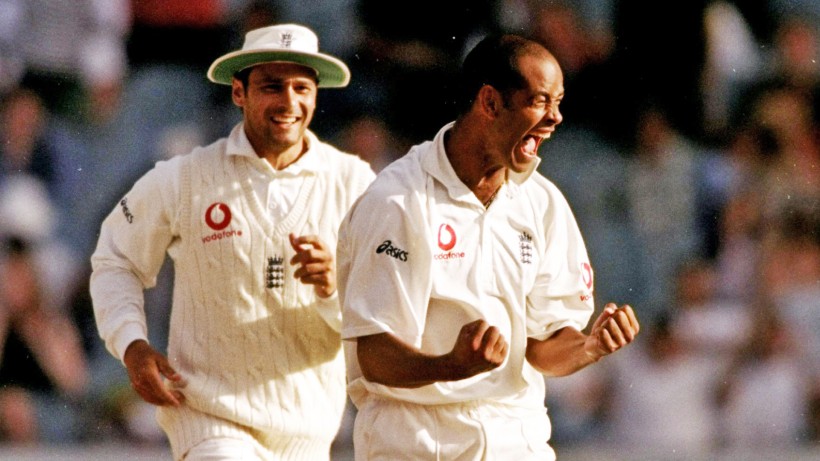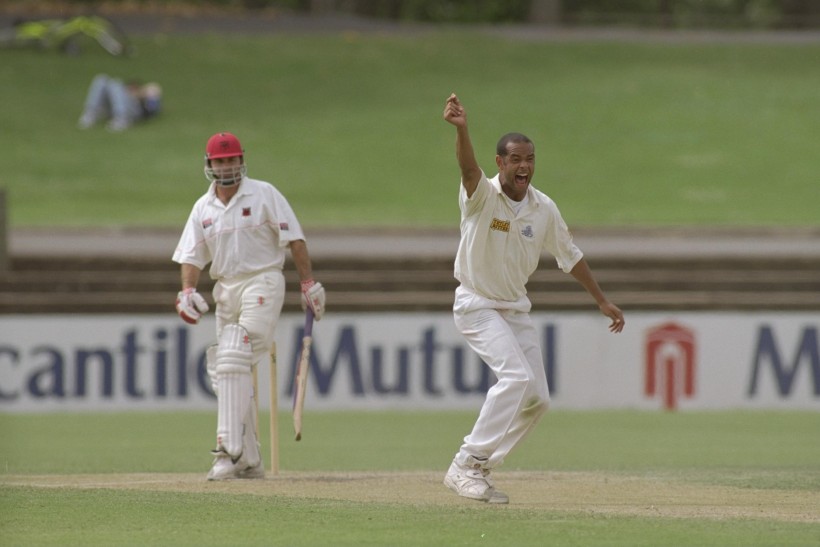Dean Headley: Hat-Trick Hero
Friday 29th October 2021

Dean Warren Headley was born on 27 January 1970, in Stourbridge, Worcestershire. His father, Ron, was a left-handed batsman who played for Worcestershire from 1958 to 1974, and played two Tests for West Indies in 1974.
Dean’s grandfather, George Headley, was the first in a long line of truly great West Indian batters, who averaged 60.83 in Tests and a fraction under 70 in his first-class career. It is perhaps surprising that his grandson became a fine fast-medium bowler, whose Test career was spent playing for England. But his West Midlands accent reveals his true allegiance.
Headley played for Staffordshire in 1990, and bowled well enough to earn a contract at Middlesex for 1991. Although he played 29 games for Middlesex over the next two seasons, his 60 first-class wickets were taken at a cost of over 40 runs each, and clearly he was not fulfilling his potential. A move to Kent at the end of 1992 changed all that. He toured Zimbabwe with Kent that Winter, and in 1993 he became a key part of Kent’s bowling attack, taking 7 for 79 against Gloucestershire at Tunbridge Wells and earning his county cap (no.178) during the last match of the season.
Throughout the 1990s, Headley was a linchpin of Kent’s bowling, but perhaps his best year was 1996, when he not only achieved his career-best analysis of 8 for 98 against Derbyshire, but also took three hat-tricks in one season, a record that even the world’s greatest hat-trick man, Doug Wright, never emulated. In the final match at Canterbury that summer, against Hampshire, Headley took his third hat-trick in Hampshire’s first innings, and Martin McCague took another in Hampshire’s second innings.
Headley first played for England when he was selected for the third Test against Australia at Old Trafford in 1997. Although Australia won the game easily, thanks in large part to Steve Waugh’s centuries in both innings, Headley emerged as England’s most successful bowler, with eight wickets.
He played 15 Tests in all, the highlight being the Boxing Day Test at Melbourne in 1998, when he turned round a match that looked completely lost for England by taking 6 for 60, including a spell of 5 for 9, as Australia crumbled from 130 for 3 to 162 all out, and England won by 12 runs.
Sadly, that was almost the end of his career, at both Test and first-class level. He played two Tests against New Zealand in 1999, but a stress fracture of the back meant that although he had won a central contract, he did not play at all in 2000, and at the beginning of 2001, he announced his retirement. He was only 31. It was a sad end to a career which would probably have taken him to even greater heights.
For Kent, Headley played 83 matches, scoring 1550 runs at an average of 18.02, with a highest score of 81. He also took 41 catches.
He took 285 wickets at 28.53, with a best analysis of 8-98. He took 5 wickets in an innings 14 times and ten wickets in a match once.
Writing in the Kent Annual in 2002, Headley said: “I will and am determined to enjoy the rest of my life. I have certainly enjoyed life up to now… Because of the manner and timing of my retirement, I was not fortunate enough to thank you all from the field of play, but maybe, as is so often the case amongst friends, words are simply not necessary.”
By Jonathan Rice

During October, we will be celebrating the contributions of a select number of Kent Cricket’s black and bi-racial cricketers from the Club’s 151-year history.
Black cricketers have made substantial contributions to Kent; in title-winning teams, and also captaining sides that live long in the memory of Kent Members and supporters.
The Club is committed to taking the right steps to ensure that Kent Cricket is a Club for everyone, and we remain fully committed to our Equality, Diversity and Inclusion Policy.
Kent Cricket CEO, Simon Storey, said: “Kent has a proud tradition of trophy-winning sides featuring players from around the world and from a variety of backgrounds.
“Although this month is Black History Month, we believe that the history of our black cricketers should be a year-long celebration.
“The Club is working hard to become more of an inclusive environment at all levels.
“We acknowledge that there is still a lot of work to do to achieve this across our sport, but we are striving to make positive steps towards a more equal, diverse and inclusive world for us all.”
